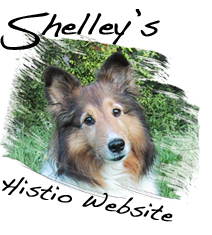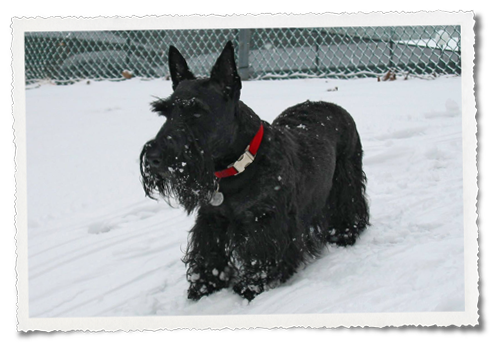
HOME
 YOUR HISTIO STORY
YOUR HISTIO STORY
I am looking for similarities
in all individual cases of
Histiocytic diseases.
I wonder if we all tell our
stories we might come up
with some commonality
between the specific
situations in which all of
our pets got this disease.
So please email me the
details and I'll put your
pets story on Shelley's
Histio Website
 UW HISTIO VERHAAL
UW HISTIO VERHAAL
Ik ben op zoek naar
overeenkomsten in alle
individuele gevallen van
Histiocytose.
Ik hoop dat wanneer wij
onze Histio verhalen
vertellen, wij overeen-
komsten ontdekken over
de manier waarop onze
huisdieren deze ziekte
hebben opgelopen.
Stuur mij de details en
ik zal het verhaal van uw
huisdier op de Histio
website van Shelley zetten.
 WARNING !
WARNING !
These stories are all
different. Individual
symptoms, situations
and circumstances
may vary and response to
therapy is not always the
same.
- Disclaimer -
 WAARSCHUWING !
WAARSCHUWING !
Deze verhalen zijn allemaal
verschillend. Individuele
symptomen, situaties en
omstandigheden kunnen
verschillen en de reactie
op therapie is niet altijd
hetzelfde.
- Disclaimer -
HISTIOCYTOSIS IN
OTHER LANGUAGES
German - Hund
Maligner Histiozytose
French - Chien
l'Histiocytose Maligne
Italian - Canis
Maligni Histiocytosis
Spanish - Perros
Histiocitosis Maligna
Dutch - Hond
Maligne Histiocytose
HOME
Dr. Fleming
Hemophagocytic Histiocytic Sarcoma
Scottish terrier
Male
July 2001- May 22, 2013


Submitted by Nellie M.
May 23, 2013
Our beloved Scottie, Dr. Fleming, passed away yesterday from Hemophagocytic Histiocytic Sarcoma. He was two months short of being 12 years old. Doctor was my husband’s wedding gift from me and being a Scottish terrier, we named him after Sir Alexander Fleming, a Scottish scientist who discovered penicillin. He came to our house when he was just 3 months old and what can I say after almost 12 years – it’s a lifetime full of unforgettable memories of a young married couple at first, then parents of a great kid (really a pillar of our strength at the moment), so many cherished and remarkable moments, every single one marked by the presence of "a big dog trapped in a small dog’s body". He was a character, alright; stubborn, as everything had to be done on his terms and a big traveler since we dragged him almost everywhere we went – hiking (Mt. Washington for one), swimming, boating. Never mind the small stature and those short legs, he never thought he was a small dog anyway. And what a fighting spirit he had, truly an inspiration to us in these moments of heartbreak.
Here’s the story of our Doctor’s very last month, for that is all it took for this killer of a cancer to take away a dog who has never been seriously sick in his entire life.
In mid-April we noticed a behavioral change, a slowing down that we at first attributed to his aging. He always required a lot of exercise – long walks (we’re talking miles and miles here) and playing ball for those liver cookies. We also noticed that his normally flat belly (as flat as it gets for a Scottie) was getting bigger. We took him to our vet who did the blood work and noticed anemia (24-27%; normal is above 37%). Unable to diagnose any tick-borne diseases, he sent us to a local pet hospital where Doctor had an ultrasound. 
Two big masses in his spleen and a smaller one in his liver were revealed, but the vet at the hospital for some reason was convinced it was some kind of an autoimmune disease that was attacking his red blood cells. Fine-needle aspiration cytology, however, was conclusively brutal - histiocytic sarcoma with erythrophagocytosis (AKA Hemophagocytic Histiocytic Sarcoma), meaning his red blood cells were continually destroyed by the cancerous histiocytes of his immune system. We now know that this form of histiocytic sarcoma has an extremely poor prognosis (reported median survival time of 2 months). Basically, as the cancer grows and metastasizes, it consumes more and more red blood cells until there are none left, as manifested by a general fatigue, mild lethargy and inappetence.
We were referred to an oncologist at that point who told us that as far as this disease goes we caught it early. Even though it metastasized to his liver, it was still small and his bone marrow was regenerating reticulocytes (red blood cell precursors) at moderate levels (349,890). It was decided that we would try to treat him with an oral chemotherapeutic called CCNU (AKA Lomustine) taken orally every 21 days for a series of approximately 5 treatments that would be paired with daily steroid administration (Prednisone).
The response rate associated with CCNU therapy is approximately 50% with a median remission duration of 4-6 months. CCNU has lots of side effects but first and foremost it is a myelosuppressive drug, it inhibits the activity of a dog’s bone marrow decreasing both the red and white blood cell count. To account for a lowered white blood cell count and increased risk of infections Doctor was put on an antibiotic (Zeniquin). We were to be back in 1 week for a complete blood count when blood counts are typically at their lowest.
After that day, Doctor became weaker by the minute. We went back in a week, did the blood test and discovered that CCNU had no effect on the tumor but did affect his bone marrow – his red blood cell count plummeted (~12%). We were told that it was time to let him go. Was chemotherapy a mistake? Could we have had more time with him were we not to have interfered? We will never know but these are the questions that plague us.
All we know is that there is a great void left now that Doctor is gone. Rest in peace, our dear little one, you’ll live in our hearts forever.
Dr. Fleming’s family
(Igor, Nellie and Nikita)


